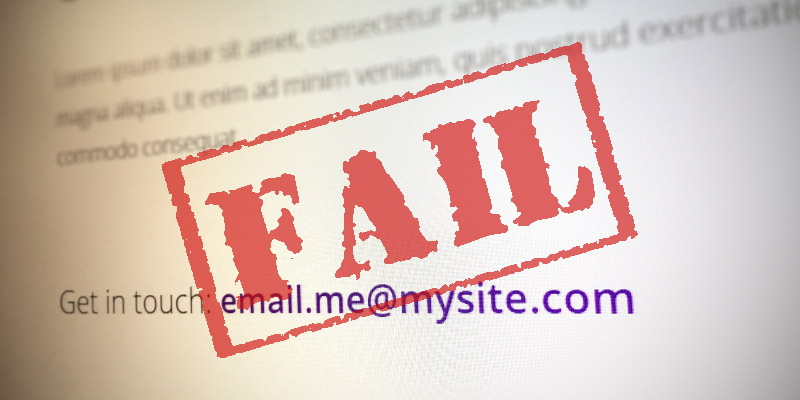catArray: articles-guidesseowebsite-managementdesign
Why You Shouldn't List Your Email Address on Your Website

It seems like a good idea, right? You want potential customers to contact you, so you provide contact details on your website. A primary phone number, maybe a direct dial or mobile number for specific team members... adding an email address just makes sense.
Or does it?
Maybe you're savvy enough to have created a linked email addresses that uses mailto: so that when a visitor clicks the link, their email client (software used to send and receive email) automatically opens a new draft email with your email address pre-populated in the "To" field. Very nice. 😉
So what's the problem?
Several things, actually.
Unless your website lacks a contact web form, you shouldn't list your email address on your website for the following reasons:
Poor User Experience
If you haven't created a mailto: link, your users have to select, copy and paste your email address into their email client in order to contact you. Not ideal.
As described earlier, a mailto: link allows your users to click your email address, at which point their system automatically opens their email client and creates a new message with your email address in the "To:" field. Better. Except...
...this only works with some email clients. If your user is using a web-based email client like Gmail (which as of April 2019 has almost 30% market share), chances are that clicking a mailto: link will simply do nothing. Not ideal.
Email Address "Harvesting"
Email addresses listed on websites are easily "harvested" by bots whose sole purpose is to locate and collect addresses to add to spam databases. There are ways to avoid your email address from being harvested but it probably isn't worth implementing such techniques. Read on...
Useful Website Performance Data is Lost
When a visitor uses email to contact you instead of the contact form that you have set up on your website, you're missing out on important information, the least of which is a simple indication of whether your website is generating enquiries. When a visitor uses your contact form, you know that user found you through your website. An email out of the blue doesn't afford you this information.
Users are Taken Away from Your Website
Ok, so a visitor gets your email address from your website and emails you - that's good, right? Except that in order to do so, they have to open their email client, which means they're no longer looking at your website. Uh uh. Not what your want. The longer you can keep users on your website, the better.
Besides the obvious benefit (keeping visitors on your website to educate them and secure their custom), the time a user spends on your website plays an important role in influencing how your site ranks in search engine results.
Conclusion
Our advice is this: let your contact form function as the primary means of collecting visitor enquiries through your website. If someone really want to get hold of you in person, they can (and will) call using the phone number you have provided.
Tags: email, seo, spam